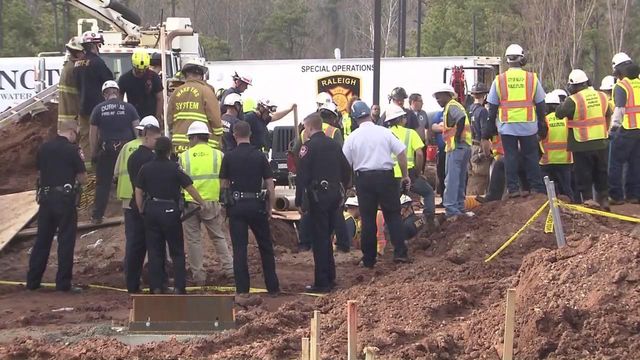Contractor: Workers weren't scheduled to be in deep trench on day of fatal collapse
More details are coming to light after a trench collapse killed one construction worker and trapped three others near Brier Creek on Wednesday.
Crews were working at a gas station construction site at 4209 Corners Parkway when a trench collapsed around 11 a.m. Four workers were in the trench at the time.
One of the workers was able to escape on his own, One had been stuck up to his thighs and was able to walk with assistance after being rescued. Another worker was in trapped up to his chest and was rescued around 12:30 p.m.
The body of the fourth worker was recovered around 4:15 p.m.
DR Mozeley Construction Group, based in Charlotte, is listed as the contractor on the project’s building permit.
Monty Hagler, a spokesman for DR Mozeley Construction Group, said the company had contracted with Georgia-based J Squared Plumbing.
Workers with J Squared Plumbing were scheduled to handle a water meter assembly in a 3-foot well at the construction site, Hagler said. They were not scheduled to work in a deeper trench.
It is not clear why the workers were in the trench Wednesday morning.
Officials said the trench was 6 to 8 feet deep after the collapse. They said they didn’t know how deep it was beforehand.
J Squared Plumbing has not responded to requests for comment.
Matt Healey, an attorney with James Scott Farrin, is a specialist is workers compensation law and has dealt with trench collapses before. He isn't involved in this case.
"These kinds of excavation projects are extremely dangerous," Healey said.
"The first thing you think about is, were appropriate safety measures being used to prevent that accident from happening at all?" he said.
He said days of rain leading up to Wednesday may have played a part in the collapse.
According to the U.S. Geological Survey, nearly 1.5 inches of rain fell in the area since Jan. 9
“Whenever it is raining, that makes the mud and dirt heavier, and I think it causes the ground to become more unstable,” Healey said.
In a statement, officials with DR Mozeley said safety of employees and subcontractors on construction sites is their highest priority and they are committed to following all industry safety standards.












